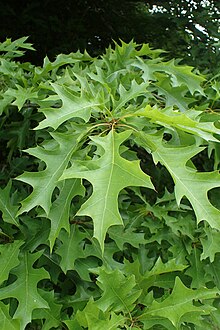Quercus texana
| Quercus texana | |
|---|---|

| |
| Scientific classification | |
| Kingdom: | Plantae |
| Clade: | Tracheophytes |
| Clade: | Angiosperms |
| Clade: | Eudicots |
| Clade: | Rosids |
| Order: | Fagales |
| Family: | Fagaceae |
| Genus: | Quercus |
| Subgenus: | Quercus subg. Quercus |
| Section: | Quercus sect. Lobatae |
| Species: | Q. texana
|
| Binomial name | |
| Quercus texana | |

| |
| Natural range of Quercus texana | |
| Synonyms[2] | |
|
List
| |
Quercus texana, commonly known as Nuttall's oak,[3][4][5][6] is a fast-growing, large deciduous oak tree.

It is a tree growing up to 85 feet (25 meters) tall, with dark brown bark. It has leaves with sharp pointed lobes somewhat similar to those of the Georgia oak (Q. georgiana) and pin oak (Q. palustris).[7] It is fast-growing and usually has a pleasing red color in autumn, much more reliably so than the pin oak.
This species was for years erroneously called Quercus nuttallii, but it is now known as Q. texana; this has created much confusion with Texas red oak, which was known as Q. texana but is now known as Q. buckleyi.[8]
It is native to the south-central United States primarily in the lower Mississippi River Valley in Louisiana, Arkansas, Mississippi, Alabama, and western Tennessee. There are additional populations in eastern Texas, southeastern Oklahoma, southeastern Missouri, far western Kentucky, and the southernmost tip of Illinois.[9]
It is still relatively obscure in the horticultural industry but is slowly gaining popularity due to its fast growth rate, ease of transplanting, good fall colors and ability to grow in wet soils. It is known for its ability to rapidly recover its gas exchange after flooding.[10]
The current world record Nuttall's Oak tree is located at the White River National Wildlife Refuge, Desha County, Arkansas. According to the National Forests Champion Trees Official Register, it boasts a trunk circumference of 274 inches, a height of 100 feet, and a crown spread of 102 feet.
References
[edit]- ^ Wenzell, K.; Kenny, L.; Jerome, D. (2017). "Quercus texana". IUCN Red List of Threatened Species. 2017: e.T194239A111265845. doi:10.2305/IUCN.UK.2017-2.RLTS.T194239A111265845.en. Retrieved 12 November 2021.
- ^ "Quercus texana Buckley". World Checklist of Selected Plant Families. Royal Botanic Gardens, Kew – via The Plant List. Note that this website has been superseded by World Flora Online
- ^ "Oaks list for The State Botanical Garden of Kentucky" (English). Retrieved 2010-05-09.
- ^ "J.C. Raulston slide 102-0276". Archived from the original (English) on 2011-06-08. Retrieved 2010-05-09.
- ^ "Missouri Department of Conservation Species Scientific Name Index". Archived from the original (English) on August 15, 2009. Retrieved 2010-05-09.
- ^ "University of Illinois Extension; Critical Issues Forum, What is the Current Status of Oaks in Illinois?" (English). Retrieved 2010-05-09.
- ^ Nixon, Kevin C. (1997). "Quercus texana". In Flora of North America Editorial Committee (ed.). Flora of North America North of Mexico (FNA). Vol. 3. New York and Oxford: Oxford University Press – via eFloras.org, Missouri Botanical Garden, St. Louis, MO & Harvard University Herbaria, Cambridge, MA.
- ^ Laurence J. Dorr and Kevin C. Nixon. 1985. Typification of the Oak (Quercus) Taxa Described by S. B. Buckley (1809-1884). Taxon 34(2): 211-228.
- ^ "Quercus texana". County-level distribution map from the North American Plant Atlas (NAPA). Biota of North America Program (BONAP). 2014.
- ^ Anderson, PH; Pezeshki, SR (1999). "The effects of intermittent flooding on seedlings of three forest species". Photosynthetica. 37 (4): 543–552. doi:10.1023/A:1007163206642. S2CID 2246144 – via Science Citation Index (SCI).
External links
[edit]- Nuttall's Oak in the Biosurvey of Oklahoma
- photo of herbarium specimen at Missouri Botanical Garden, collected in Missouri in 1989

